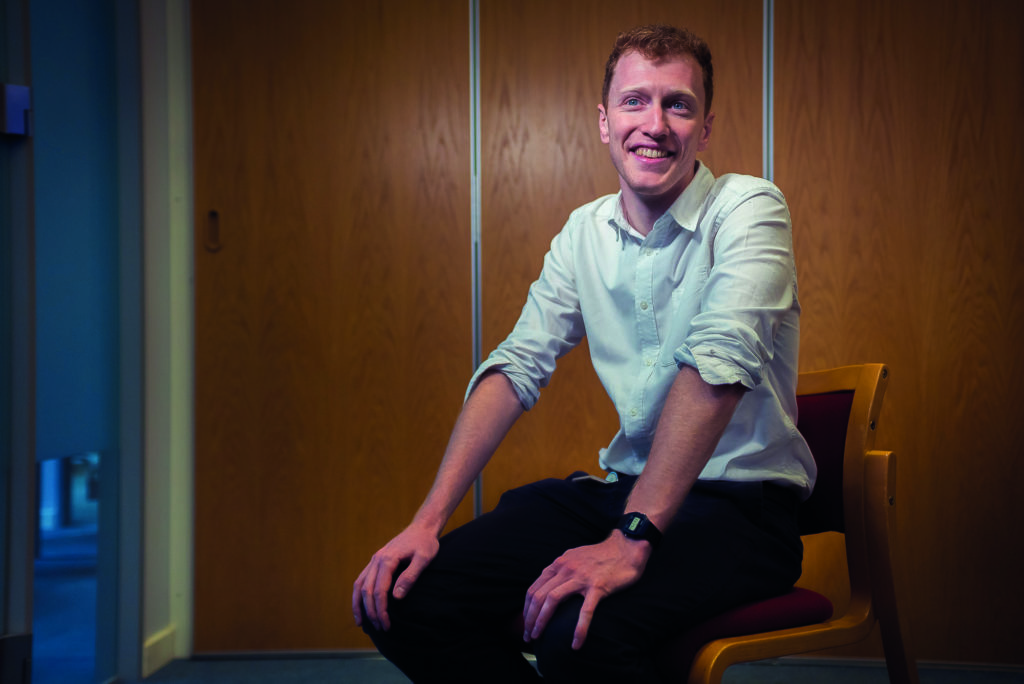
Chris Hardy is one of our Pauline Ashley Fellows, based at the University College London (UCL) Dementia Research Institute. Alongside the Dunhill Medical Trust, we’re funding him to study how hearing and brain function are linked in the context of dementia.
How did you become a researcher?
I studied Psychology at the University of Exeter, and then moved to UCL to do a Master’s degree in Cognitive Neuroscience. I then completed my PhD in Neurodegenerative Diseases, also at UCL.
I’ve come into this field with a slightly different trajectory to most researchers – my background is actually in dementia research. My grandmother had the most common form of dementia (Alzheimer’s disease) and this was one of the reasons I wanted to do research in this area.
During my PhD, I met hundreds of people with different forms of dementia. They would consistently tell me about their problems with hearing in certain environments, such as a crowded room, or with tinnitus or ‘hyperacusis’ (heightened sensitivity to sounds). But for many of them, the link between these symptoms and their diagnosis of dementia hadn’t really been explored.
What is the aim of your research?
My research aims to help us understand how hearing and brain functions are linked. If the hearing brain is damaged in dementia, rather than the ears, it’s unlikely that conventional hearing aids alone will be the answer. Successful treatment might require changes to the person’s hearing environment, communication training or medication.
My Fellowship will tackle these problems for the first time. I will compare ear and hearing brain functions in two major dementia diseases – Alzheimer’s and the less common primary progressive aphasia (PPA) – compared to healthy older people.
In the first phase, I’ve designed some new tests and ways of assessing how well the ‘hearing’ parts of the brain are working in people with different forms of dementia. I’m now happy with these tests, so I’m inviting people with Alzheimer’s disease and PPA to take part in the research with me.
Why is your research important?
There is evidence suggesting that people who experience hearing loss in mid-life have an increased risk of developing dementia further down the line – and that dementia can make the impact of hearing loss worse. But in spite of this, we still do not understand exactly how dementia and hearing loss are related.
‘Dementia’ is actually an umbrella term – there are many different types. These diseases often damage the hearing areas of the brain, and affect how the brain interprets the sound signals arriving from the ears. With Alzheimer’s, people complain from very early in the disease of difficulty understanding speech and other sounds in busy environments, such as a restaurant or pub. With PPA, hearing and language problems are at the forefront.
We know that keeping the brain active, through education, playing a musical instrument, speaking a second language and so on can help prevent or delay dementia. So it might be that people who experience hearing loss in mid-life are receiving less of this cognitive stimulation. This could be directly, through not hearing what is being said in social situations, or indirectly, by causing them to avoid social situations altogether. As a result, they might experience symptoms of dementia earlier than in people without hearing loss.
If so, it could mean that addressing hearing loss (rather than ignoring it and trying to ‘get by’) could reduce someone’s risk of developing dementia. That’s a really exciting thought. It’s beyond the scope of my two-year study, but other researchers are looking at this in earnest.
What does RNID funding mean to you?
Hearing loss and dementia both present huge health issues for our rapidly ageing population. In both areas, new therapies are now on the horizon so it’s hugely exciting to be a scientist in this field. We need to ‘push on’ and make the breakthroughs that will make a real, tangible difference to people’s lives. I’m biased, but I think that both issues need increased funding and attention – together and separately. That’s why I’m so grateful for the funding from RNID.
What drives me is the hope that my research might help people, now or in the future. I feel so lucky and privileged to be able to go into work each morning to do a job that I love. If I ever get frustrated by something in my research, I remind myself that the work I’m doing is only possible because of the incredible donations and support that people have given to RNID and the Dunhill Medical Trust.
It’s extremely humbling and incredibly motivating – I want to repay the faith that people have put in me by funding my research.